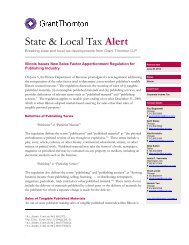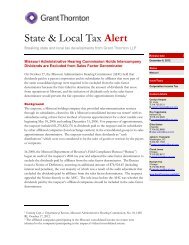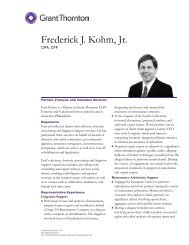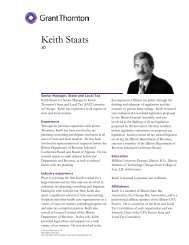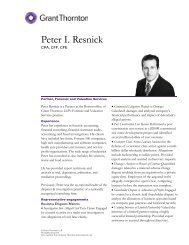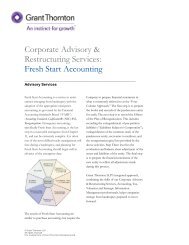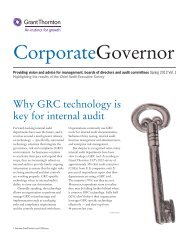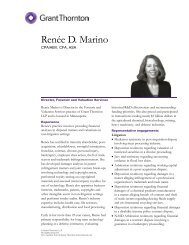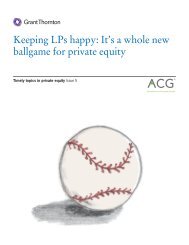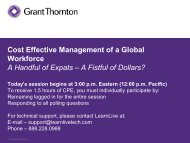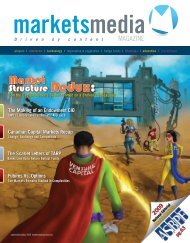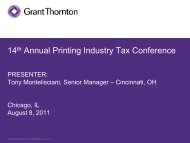Read the SALT Alert. - Grant Thornton LLP
Read the SALT Alert. - Grant Thornton LLP
Read the SALT Alert. - Grant Thornton LLP
You also want an ePaper? Increase the reach of your titles
YUMPU automatically turns print PDFs into web optimized ePapers that Google loves.
State & Local Tax <strong>Alert</strong><br />
Breaking state and local tax developments from <strong>Grant</strong> <strong>Thornton</strong> <strong>LLP</strong><br />
Release date<br />
California FTB Clarifies Economic Nexus Principles Do Not Apply<br />
to Throwback Rule for Tax Years Before 2011<br />
The California Franchise Tax Board (FTB) has issued a Technical Advice Memorandum<br />
to explain that economic nexus standards do not apply when applying <strong>the</strong> throwback rule<br />
to tax years beginning before January 1, 2011. 1 During <strong>the</strong>se prior tax years, California law<br />
required physical presence to establish substantial nexus for purposes of <strong>the</strong> Commerce<br />
Clause of <strong>the</strong> U.S. Constitution. Thus, a taxpayer must demonstrate physical presence in<br />
<strong>the</strong> destination state to establish that it is subject to taxation in that state in order to avoid<br />
<strong>the</strong> throwback rule for tax years prior to 2011.<br />
Throwback Rule and Nexus Standards<br />
In determining that a taxpayer must have a physical presence in <strong>the</strong> destination state to<br />
avoid <strong>the</strong> throwback rule for tax years prior to 2011, ra<strong>the</strong>r than asserting <strong>the</strong> existence of<br />
substantial sales in a destination state without physical presence, <strong>the</strong> FTB reviewed<br />
California’s statutory and regulatory throwback provisions, <strong>the</strong> nexus requirements and<br />
California’s new economic nexus standard.<br />
Throwback Rule<br />
For purposes of <strong>the</strong> sales factor component of <strong>the</strong> formula used to apportion income to<br />
California, tangible personal property shipped from California is generally assigned<br />
(thrown back) to California if <strong>the</strong> taxpayer is not taxable in <strong>the</strong> destination state. 2 For<br />
purposes of <strong>the</strong> throwback rule, a taxpayer is taxable in ano<strong>the</strong>r state if: (i) in that state it is<br />
subject to a net income tax, a franchise tax measured by net income, a franchise tax for <strong>the</strong><br />
privilege of doing business or a corporate stock tax; or (ii) that state has jurisdiction to<br />
subject <strong>the</strong> taxpayer to a net income tax regardless of whe<strong>the</strong>r, in fact, <strong>the</strong> state does or<br />
does not. 3<br />
If a sale is destined for a foreign country, U.S. Constitutional standards are used to<br />
determine whe<strong>the</strong>r a taxpayer is subject to taxation in that country. 4 A taxpayer’s sales will<br />
not be thrown back to California if: (i) <strong>the</strong> taxpayer is subject to an income tax in <strong>the</strong><br />
December 20, 2012<br />
States<br />
California<br />
Issue/Topic<br />
Corporate Income Tax<br />
Contact details<br />
Scot Grierson<br />
Irvine<br />
T 949.608.5320<br />
E scot.grierson@us.gt.com<br />
David Griffiths<br />
Irvine<br />
T 949.608.5210<br />
E david.grifiths@gt.com<br />
Eddie Delgado<br />
Los Angeles<br />
T 213.596.3448<br />
E eddie.delgado@us.gt.com<br />
Maria Tran<br />
Los Angeles<br />
T 213.596.6733<br />
E maria.tran@us.gt.com<br />
Giles Sutton<br />
Dallas<br />
T 704.632.6885<br />
E giles.sutton@us.gt.com<br />
Jamie C. Yesnowitz<br />
Washington, DC<br />
T 202.521.1504<br />
E jamie.yesnowitz@us.gt.com<br />
Chuck Jones<br />
Chicago<br />
T 312.602.8517<br />
E chuck.jones@us.gt.com<br />
www.<strong>Grant</strong><strong>Thornton</strong>.com/<strong>SALT</strong><br />
1 Technical Advice Memorandum 2012-01, California Franchise Tax Board, Nov. 29, 2012.<br />
2 CAL. REV. & TAX. CODE § 25135.<br />
3 CAL. REV. & TAX. CODE § 25122.<br />
4 CAL. CODE REGS. tit. 18, § 25122.
<strong>Grant</strong> <strong>Thornton</strong> <strong>LLP</strong> - 2<br />
foreign country; or (ii) <strong>the</strong> foreign country could impose an income tax under U.S.<br />
Constitutional standards. 5<br />
Substantial Nexus Requirement<br />
Before a state may impose an income tax, <strong>the</strong> Due Process and Commerce Clauses of <strong>the</strong><br />
U.S. Constitution require that nexus exists between <strong>the</strong> taxpayer and <strong>the</strong> taxing state. 6 For<br />
purposes of <strong>the</strong> Due Process Clause, nexus exists if an out-of-state company purposely<br />
avails itself of <strong>the</strong> benefits of an economic market in <strong>the</strong> state, even though it may not be<br />
physically present in <strong>the</strong> state. 7 Nexus is present under <strong>the</strong> Commerce Clause if <strong>the</strong><br />
activities <strong>the</strong> state seeks to tax have substantial nexus with <strong>the</strong> state. 8 As explained by <strong>the</strong><br />
FTB, <strong>the</strong> rules concerning whe<strong>the</strong>r <strong>the</strong> Commerce Clause’s substantial nexus standards<br />
require physical presence have evolved over time. However, <strong>the</strong> FTB noted that<br />
“California authorities have consistently provided that physical presence is required in<br />
order for a taxpayer to have sufficient nexus to be subject to tax.” 9<br />
Economic Nexus Standard<br />
California defines “doing business” as “actively engaging in any transaction for <strong>the</strong><br />
purpose of financial or pecuniary gain or profit.” 10 For taxable years beginning on or after<br />
January 1, 2011, a corporation is doing business in California if <strong>the</strong> taxpayer’s sales in<br />
California exceed <strong>the</strong> lesser of $500,000 or 25 percent of <strong>the</strong> taxpayer’s total sales. 11<br />
Physical Presence Required Prior to 2011<br />
Based on <strong>the</strong> authority discussed above, <strong>the</strong> FTB determined that <strong>the</strong> new economic<br />
nexus standard only applies to tax years beginning on or after January 1, 2011. According<br />
to <strong>the</strong> FTB, “[b]y enacting legislation providing that a taxpayer is doing business in<br />
California where a taxpayer’s only contact with this state are sales exceeding $500,000,<br />
California’s Legislature determined for <strong>the</strong> first time that substantial economic presence<br />
meets Constitutional standards under California law.” The FTB fur<strong>the</strong>r stated that “[i]n<br />
enacting this statutory provision, California’s Legislature determined that under California<br />
law, physical presence is no longer required in order for <strong>the</strong> state to subject a business to<br />
tax.” Therefore, for throwback purposes in tax years before 2011, a taxpayer must<br />
5 Id.<br />
6 Quill Corp. v. North Dakota, 504 U.S. 298 (1992).<br />
7 Id.<br />
8 Id.<br />
9 The FTB cited Appeal of Dresser Industries, Inc., California State Board of Equalization, No. 82-SBE-<br />
307, June 29, 1982, rehearing No. 83-SBE-118, Oct. 26, 1983; Appeal of John H. Grace Co., California<br />
State Board of Equalization, No. 80-SBE-115, Oct. 28, 1980; as well as some unpublished<br />
decisions.<br />
10 CAL. REV. & TAX. CODE § 23101(a).<br />
11 CAL. REV. & TAX. CODE § 23101(b). The statute also provides that a taxpayer is doing business<br />
in <strong>the</strong> state if <strong>the</strong> taxpayer’s tangible property or payroll in <strong>the</strong> state exceeds $50,000 or 25 percent<br />
of <strong>the</strong> taxpayer’s total property or payroll.
<strong>Grant</strong> <strong>Thornton</strong> <strong>LLP</strong> - 3<br />
demonstrate physical presence 12 in <strong>the</strong> destination state to prove that it is subject to<br />
taxation in that state. If it meets this requirement, <strong>the</strong> taxpayer is not required to throw<br />
back <strong>the</strong>se sales for tax years prior to 2011.<br />
Commentary<br />
Earlier this year, <strong>the</strong> FTB released a Chief Counsel Ruling that applied California’s new<br />
economic nexus standard, <strong>the</strong> Finnigan rule, and market-based sourcing to determine when<br />
<strong>the</strong> throwback rule applies to sales of items shipped from California to ano<strong>the</strong>r<br />
jurisdiction. 13 When examining <strong>the</strong> interplay between <strong>the</strong> economic nexus standard and<br />
<strong>the</strong> throwback rule, <strong>the</strong> FTB noted that it was not considering <strong>the</strong> potential applicability of<br />
<strong>the</strong> economic nexus rules for tax years prior to 2011, perhaps with <strong>the</strong> knowledge that <strong>the</strong><br />
FTB was considering <strong>the</strong> issuance of this Technical Advice Memorandum. As a result of<br />
both releases, taxpayers are provided with guidance concerning <strong>the</strong> throwback rule for tax<br />
years before 2011 (when <strong>the</strong> economic nexus standard was not in effect) as well as<br />
subsequent tax years (when <strong>the</strong> economic nexus standard is in effect).<br />
Apparently, some taxpayers have argued that <strong>the</strong> economic nexus standard applied to tax<br />
years beginning before 2011 for purposes of <strong>the</strong> throwback rule, particularly as many<br />
states o<strong>the</strong>r than California have administered <strong>the</strong>ir corporate-level taxes with statutory,<br />
regulatory or policy-driven economic nexus rules. Under this argument, substantial sales<br />
in <strong>the</strong> destination state would be sufficient to avoid <strong>the</strong> throwback rule. This guidance<br />
clarifies <strong>the</strong> FTB’s position that physical presence is necessary to escape <strong>the</strong> throwback<br />
rule for tax years prior to 2011. Thus, a taxpayer must have a stronger connection with<br />
<strong>the</strong> destination state in <strong>the</strong>se prior tax years if it does not want to throw back its sales.<br />
The information contained herein is general in nature and based on authorities that are subject to change.<br />
It is not intended and should not be construed as legal, accounting or tax advice or opinion provided by<br />
<strong>Grant</strong> <strong>Thornton</strong> <strong>LLP</strong> to <strong>the</strong> reader. This material may not be applicable to or suitable for specific<br />
circumstances or needs and may require consideration of nontax and o<strong>the</strong>r tax factors. Contact <strong>Grant</strong><br />
<strong>Thornton</strong> <strong>LLP</strong> or o<strong>the</strong>r tax professionals prior to taking any action based upon this information. <strong>Grant</strong><br />
<strong>Thornton</strong> <strong>LLP</strong> assumes no obligation to inform <strong>the</strong> reader of any changes in tax laws or o<strong>the</strong>r factors that<br />
could affect information contained herein. No part of this document may be reproduced, retransmitted or<br />
o<strong>the</strong>rwise redistributed in any form or by any means, electronic or mechanical, including by photocopying,<br />
facsimile transmission, recording, re-keying or using any information storage and retrieval system without<br />
written permission from <strong>Grant</strong> <strong>Thornton</strong> <strong>LLP</strong>.<br />
12 Note that this can be established ei<strong>the</strong>r directly or through agents or independent contractors.<br />
13 Chief Counsel Ruling 2012-03, California Franchise Tax Board, Aug. 28, 2012. For more<br />
information, see GT <strong>SALT</strong> <strong>Alert</strong>: California FTB Chief Counsel Ruling Applies New Economic<br />
Nexus Principles to Use of Throwback Rule, Nov. 15, 2012.
<strong>Grant</strong> <strong>Thornton</strong> <strong>LLP</strong> - 4<br />
Tax professional standards statement<br />
This document supports <strong>the</strong> marketing of professional services by <strong>Grant</strong> <strong>Thornton</strong> <strong>LLP</strong>. It is<br />
not written tax advice directed at <strong>the</strong> particular facts and circumstances of any person. Persons<br />
interested in <strong>the</strong> subject of this document should contact <strong>Grant</strong> <strong>Thornton</strong> or <strong>the</strong>ir tax advisor<br />
to discuss <strong>the</strong> potential application of this subject matter to <strong>the</strong>ir particular facts and<br />
circumstances. Nothing herein shall be construed as imposing a limitation on any person from<br />
disclosing <strong>the</strong> tax treatment or tax structure of any matter addressed. To <strong>the</strong> extent this<br />
document may be considered written tax advice, in accordance with applicable professional<br />
regulations, unless expressly stated o<strong>the</strong>rwise, any written advice contained in, forwarded with,<br />
or attached to this document is not intended or written by <strong>Grant</strong> <strong>Thornton</strong> <strong>LLP</strong> to be used,<br />
and cannot be used, by any person for <strong>the</strong> purpose of avoiding any penalties that may be<br />
imposed under <strong>the</strong> Internal Revenue Code.




